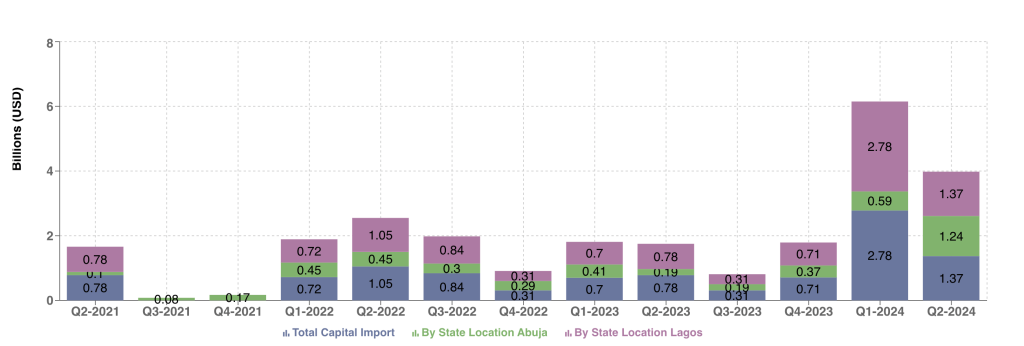
In a concerning trend, 32 out of Nigeria’s 37 states saw zero capital importation—foreign investments—during the first nine months of 2024. This marks a significant rise from 2023, when 27 states attracted no foreign capital.
This data, sourced from the National Bureau of Statistics (NBS), reveals the uneven distribution of investment across the country, highlighting regional disparities in economic development.
According to the latest Capital Importation figures for the third quarter of 2024, Nigeria attracted a total of $1.2 billion in foreign investments during the quarter. However, this figure represents a substantial decline compared to the second quarter, when the country recorded $2.6 billion, and the first quarter, which saw $3.3 billion in capital inflows.
Overall, Nigeria’s total capital importation for the first nine months of 2024 has reached $7.1 billion. This marks a significant increase from the $3.9 billion attracted in all of 2023. While the year-on-year rise in capital inflows appears positive at first glance, it masks the unequal distribution of these investments across the country, raising concerns about the failure of growth to translate into broader economic benefits for all states.
Capital Importation by State
The NBS data reveals that only five states and the Federal Capital Territory (FCT) have recorded foreign capital inflows in 2024. Lagos leads by a wide margin, attracting a staggering $4.6 billion in foreign investments. The FCT follows with $2.39 billion in capital inflows. Ekiti, a relatively smaller state, saw minimal foreign investment, totaling just $120,000—most of which came in the third quarter. Enugu and Kaduna also recorded modest capital importation, attracting $180,000 and $1.95 million respectively in the third quarter.
States like Abia, Akwa Ibom, Anambra, Niger, Ogun, Ondo, and Rivers, which had attracted foreign investments in 2023, have seen no inflows this year. Furthermore, oil-producing states such as Bayelsa, Ebonyi, Gombe, Jigawa, Kebbi, Taraba, Yobe, and Zamfara have failed to attract any capital whatsoever in 2024. This glaring absence of capital in regions with significant natural resources raises questions about the underlying causes of such a stark imbalance.
Implications of the Data
The concentration of capital inflows in just a few states underscores significant systemic inefficiencies in Nigeria’s investment landscape. Lagos and the FCT’s dominance can be attributed to their superior infrastructure, business-friendly regulatory environments, and concentrations of economic activity. However, this trend also highlights the neglect of other states, particularly those with untapped resources or strategic potential.
The lack of foreign capital flowing into states rich in natural resources—such as Bayelsa and Rivers—points to deeper issues plaguing Nigeria’s investment climate. These issues include widespread insecurity, poor governance, lack of investor confidence, and inadequate infrastructure. For example, oil-producing states, which should theoretically benefit from their natural wealth, have seen little to no foreign investments, raising concerns about the long-term sustainability of their economic growth.
The data also paints a troubling picture for smaller and less-developed states, which struggle to attract the capital needed to drive infrastructure development, create jobs, and foster economic growth. This uneven distribution of investments not only perpetuates regional disparities but also risks stalling the broader national development agenda.
A Decline in Investment Confidence
In addition to the regional disparities in capital importation, the third quarter of 2024 also saw a sharp decline in total foreign investments compared to the previous quarter. The $1.2 billion recorded in Q3 represents a 51.9% drop from the $2.6 billion attracted in Q2 2024, indicating a sharp contraction in foreign investment inflows. While this decline contrasts with the overall year-on-year growth of 91.35% from Q3 2023, it suggests a retreat in investor confidence, possibly linked to global economic uncertainties or domestic challenges in Nigeria.
Despite the impressive year-on-year growth in capital importation, the significant drop from the second to the third quarter is a cause for concern. This decline may reflect broader economic challenges, including inflation, political instability, and policy uncertainties that could be dampening foreign investors’ enthusiasm about Nigeria’s prospects.
Conclusion
While Nigeria has experienced a notable increase in total capital importation in 2024, the uneven distribution of investments across states underscores the structural challenges facing the country’s economy. The dominance of Lagos and the FCT in attracting foreign investments highlights the lack of attention and resources directed toward other regions, particularly those with substantial natural resources.
For Nigeria to achieve more inclusive economic growth, policymakers must address the underlying issues hindering investment in states outside of Lagos and the FCT. These include improving infrastructure, enhancing security, ensuring political stability, and fostering a more investor-friendly environment across all regions. Until these systemic challenges are addressed, the benefits of foreign capital will likely remain concentrated in a few states, leaving the rest of the country at a disadvantage.


